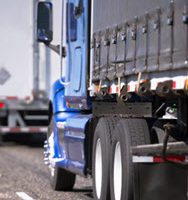Common Causes of Truck Accidents

Truck accidents make up a very small percentage of automobile accidents. However, they can result in devastating injuries and extensive property damage due to the large size, high speed, and strong forces of the truck. These injuries can even include traumatic brain injuries, paralysis, disfigurement, or even death. What are the common causes of truck accidents? Read on to discover them, as well as to discover some methods to avoid these terrible accidents.
Blind Spots
Trucks are so massive that they have numerous blind spots, or places where a driver cannot see. There are blind spots in front of the truck cab, below it, behind the driver side door, on the right side of the cab, and on the back of the trailer. Even if a driver tries to check these areas, he or she is likely to be unsuccessful simply because of the positioning and structure of a large truck. Avoid tailgating and driving directly behind a truck, as the driver may not be able to see you. Also avoid staying in one of the blind spots alongside the truck, as the driver may attempt to change lanes and cause a side impact crash.
Braking Failure
Trucks drive many thousands of miles each year, so it’s unsurprising that the brakes on trucks often wear down quickly. Keep in mind too that the driver must stop their vehicle weighing up to 80,000 pounds, which can be difficult even in the best of conditions- with new brakes, good weather, and a fully alert driver. Brakes that are not inspected or are poorly maintained are at risk for failure or for causing the truck to require more space to stop safely. Always keep a safe distance between your vehicle and trucks.
Overweight or Overloaded Trucks
Another common reason for truck accidents occurs when a truck is overloaded or overweight and a driver loses control of the truck. There are several protocols and laws in place to guide how much trucks may carry at a given time, but some states permit trucks to deviate from these policies with a special permit. An overloaded truck can cause a truck to perform differently than one that is not overloaded. An overloaded truck may go down an incline much faster than expected by the driver. The driver may need additional space in order to brake safely. Or, loads may be improperly distributed inside the truck, knocking the truck off-balance.
Driver Fatigue
Yet another cause of truck accidents that is commonplace is driver fatigue. Truck drivers drive many thousands of hours each year. Rules prohibit truck drivers from driving certain lengths of time without a break, but some drivers do not adhere to these rules. Fatigued drivers have a harder time reacting to what’s happening on the road, may have reduced reaction time, may not notice obstacles or other vehicles, or may have other faults caused by lack of sleep.
Have You Been Injured in a Truck Accident?
If you’ve been injured in a truck accident, the Columbia truck accident attorneys at The Stanley Law Group can help. We have significant experience with truck accident cases and can help protect your rights and interests. Call 803-799-4700 and set up a consultation today.
https://www.thestanleylawgroup.com/5-mistakes-people-make-after-a-truck-accident/

